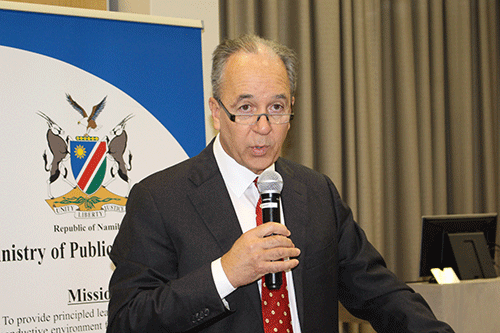Edward Mumbuu Jnr
When public enterprises minister Leon Jooste took over as founding minister in that portfolio, a daunting task lay ahead of him in reforming Namibia’s tax dollar-sucking parastatals, where bailouts are the norm, with little to no accountability.
For the first five years, without the public enterprises’ governance legislation in place, Jooste had always maintained that his hands were tied.
That law is in place now – and it has given the minister enough teeth to effect the much-needed reforms.
In TransNamib, Jooste faces a paradox. Documents seen by Nampa posit a company in a dire financial position, where procurement laws are circumvented with impunity, while potential human capital and pension fund irregularities exist.
This has left Jooste concerned over the parastatal’s survival. “I have reason to be concerned about TransNamib, as they are commercially somewhat distressed at the moment,” he said in response to questions recently.
In November last year, Jooste instructed TransNamib board chairperson Sigrid Tjijorokisa to institute an investigation into allegations, “which, if true and left unchecked, may have detrimental consequences for the operational and financial sustainability” of the public company.
“The investigation has not been concluded, as the procurement process is still ongoing,” Jooste said.
He said the TransNamib mess was inherited.
“They inherited a large, complicated company with a lot of negative momentum and they’ve been trying very hard to turn this around,” Jooste said.
On the contrary, company documents seen by Nampa paint a different picture – that of a management team that may have misled Jooste.
“Misleading one’s shareholder is always an extremely serious transgression – and if this has occurred, I will leave no stone unturned to expose where and why this has occurred,” he said.
He added: “We will not allow TransNamib to fail – and we are convinced that the current interventions are all in the best interest of the company”.
Chief among the myriad of allegations against TransNamib is that the company has a bloated management structure consisting of nine executives.
Nampa understands that most of the executives take home no less than N$100 000 in monthly salaries, a vehicle allowance of N$15 000 and N$6 000 in fuel allowance.
The selective implementation of the company’s performance management policy has also been questioned.
In 2020, only TransNamib’s CEO Johny Smith and three executives were paid performance bonuses. There were only four executives at the time.
When submitting their performance case to the board in 2019, they premised it on the company’s increased revenue of N$54 million (11%) for the 2018/19 financial year.
During that period, TransNamib recorded a loss of N$80 million against an anticipated loss of N$315 million, a feat worthy of celebration, they said.
In return, they were paid around N$700 000, averaging N$175 000 each.
In addition, some TransNamib bosses appear to be a law unto themselves. For example, procurement manager Ricky Bezuidenhoudt wrote to the executive for properties, Alynsia Platt, asking why she was being circumvented in the procurement processes.
She asked Platt in an email: “Questions that came to mind is, how was the supplier[s], service providers selection done…?”
Platt retorted: “I am not your equal; therefore, do not address me as if I am. Alternatively, refrain from address[ing] me directly”.
In addition, three temporary Zimbabwean nationals’ diesel electrical fitter positions qualify for unfettered benefits, including those reserved for permanent staff, such as housing allowance, medical aid and pension.
To understand TransNamib’s history, Nampa interviewed a former executive, Mike Kavekotora, who at one point served as its CEO, but was booted from his job when he ventured into politics in 2009.
Kavekotora holds the view that political interference has led to the parastatal’s demise.
“The appointment of board members and CEOs at the public enterprise has become a political decision, ignoring competency, effectiveness and efficiency,” he said.
He charged that even he was a victim of this, merely for having chosen a different political home in the opposition Rally for Democracy and Progress (RDP).
“When I got to TransNamib as a general manager, the CEO at the time, Titus Haimbili, was implicated in some fraudulent transactions. He was disciplined. He was fired. But they [politicians] brought him back because the board appointed me as the acting CEO,” he narrated.
At independence, TransNamib was in a sound financial position, as it was prudently run, with a positive bank balance of around N$400 million, he remembers.
“The Swapo government took over TransNamib and did two things: they separated the company and the rolling stock (the railway),” he said.
This meant that TransNamib was purely responsible for operations while maintenance of the rail was the responsibility of the government [works ministry].
“The railway was never properly maintained. It dilapidated to a level where, when I was there, the locomotives could only run five kilometres per hour,” he added.
According to Kavekotora, several politically-motivated decisions only added to the rail company’s existing woes.
“Instead of rehabilitating the railway fully to increase the delivery time, they took a political decision, like extending the railway from Tsumeb to the north. That was a stupid move,” he charged, explaining further: “Our main load comes from Walvis Bay. The railway from Walvis Bay to Tsumeb was totally dilapidated. So, even if the train had to go to Tsumeb for the load to be delivered in Ondangwa, it would take ages for that load to come.”
The RDP leader further said: “The majority of the whites who were there moved out of TransNamib and established companies and institutions that became TransNamib’s competitors, especially the truck businesses. Also, some of the people who were left in TransNamib were giving information to people who had left the company as to what to do in order to basically steal the market share,” he continued.
Haimbili did not respond to detailed questions sent to him.
Two other former executives Sara Naanda and Hippy Tjivikua declined to comment on matters relating to the company.
- Nampa


